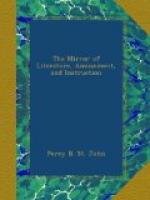* * * * *
The inquiries of the committee appointed to devise means for the suppression of mendicity, leave us no reason to doubt that in an average of cases a London beggar made by “his trade” eighteen-pence per day, or twenty-seven pounds per annum!
* * * * *
One-ninth of the whole population of Paris are wholly maintained by funds which the different bureaux of charity distribute for their relief; and still a countless horde of mendicants infest her streets, her quays, and all her public places.
* * * * *
Science and literature are “the nourishment of youth, the delight of age, the ornaments of prosperous life, the refuge and consolation of adversity, the companions of our weary travels, of our rural solitudes, of our sleepless nights.”
* * * * *
The following quotation from Jamieson’s Scottish Dictionary points out the frugal and temperate Scot; and, in illustration, may be contrasted with the proverbial invitation of the better feeding English, “Will you come and take your mutton with me?”
“KAIL, used metonimically for the whole dinner; as constituting among our temperate ancestors the principal part, s.
“Hence, in giving a friendly invitation to dinner, it is common to say, ‘Will you come and tak your kail wi’ me?’ This, as a learned friend observes, resembles the French invitation, Voulez vous venir manger la soupe chez moi!”
* * * * *
THE RIVER NILE.
Ledyard, in his Travels, speaks thus contemptuously of this celebrated wonder:—“This is the mighty, the sovereign of rivers—the vast Nile that has been metamorphosed into one of the wonders of the world! Let me be careful how I read, and, above all, how I read ancient history. You have heard, and read too, much of its inundations. If the thousands of large and small canals from it, and the thousands of men and machines employed to transfer, by artificial means, the water of the Nile to the meadows on its banks—if this be the inundation that is meant, it is true; any other is false; it is not an inundating river.”
* * * * *
The Jewish children to this day celebrate the fall and death of Haman, and on that anniversary represent the blows which they would fain deal on his scull, by striking with envenomed fury on the floor with wooden hammers. This observance was but very lately forbidden in the Grand Duchy of Baden.
* * * * *
TRAVELLING FOLLIES.
“Many gentlemen,” says an old English author, “coming to their lands sooner than to their wits, adventure themselves to see the fashion of other countries; whence they see the world, as Adam had knowledge of good and evil, with the loss or lessening of their estate in this English Paradise; and bring home a few smattering terms, flattering garbs, apish carriages, foppish fancies, foolish guises and disguises, the vanities of neighbour nations.”




